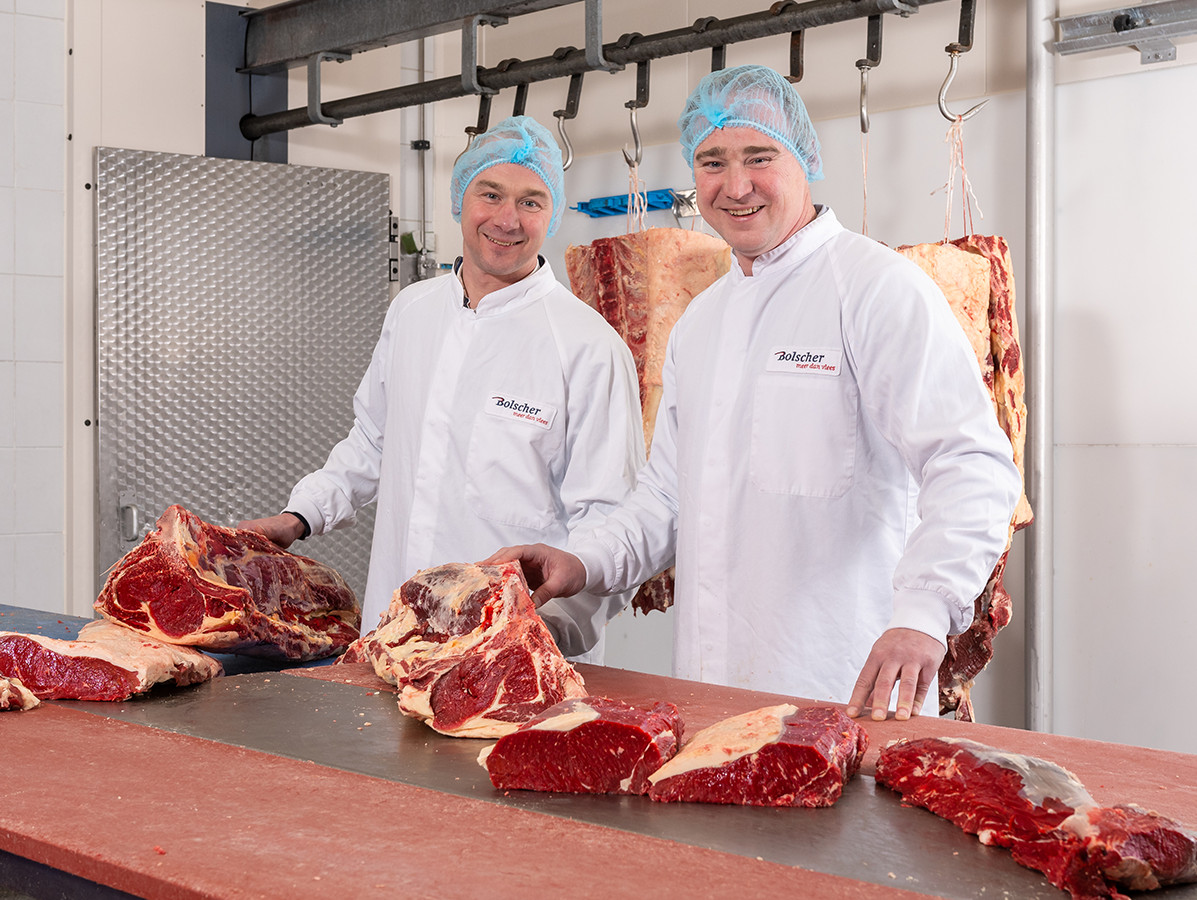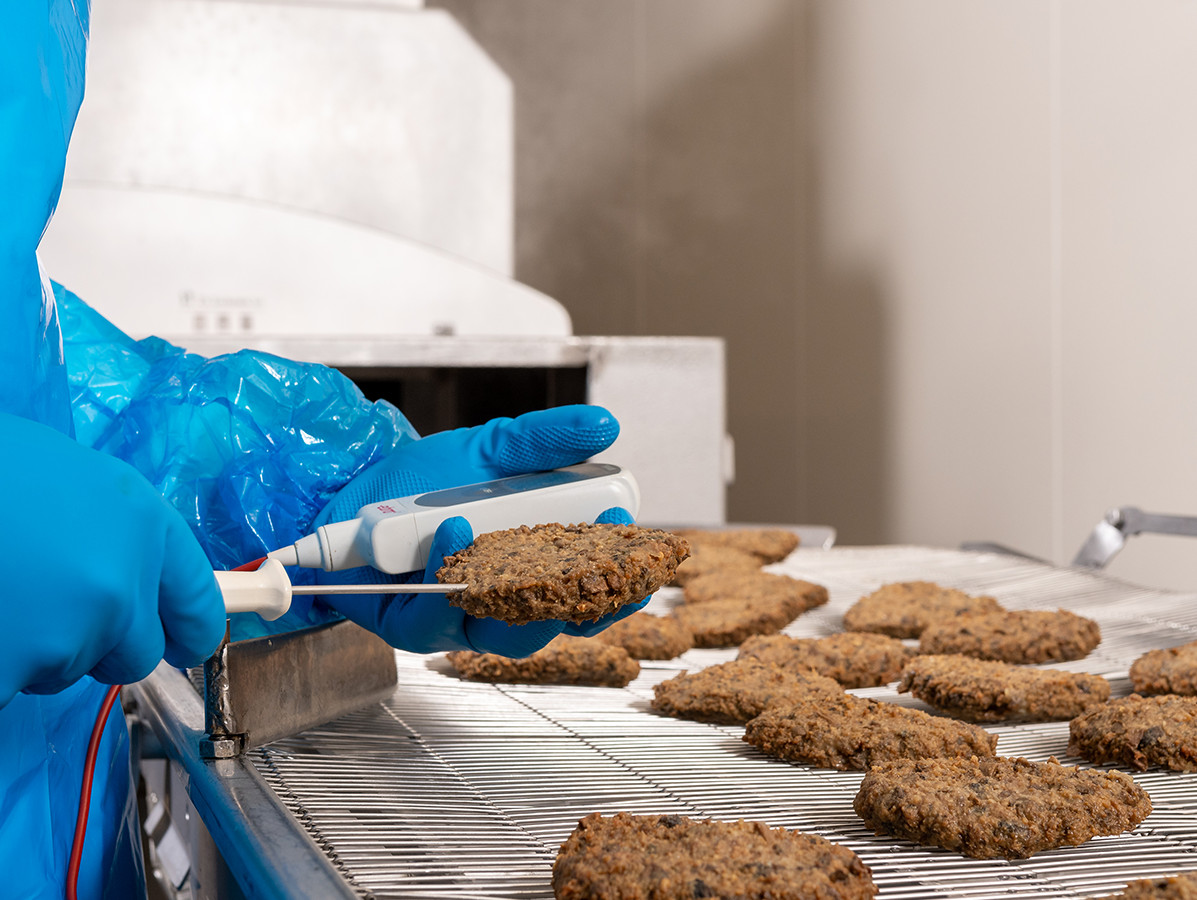
We have to be more careful with our planet. For example, by taking a larger part of our proteins from vegetable sources and opting for sustainable energy. The brothers Roy and Chiel Bolscher, owners and directors of the 'Bolscher more than meat' meat company in Enschede, are also convinced of this.
Roy and Chiel Bolscher did not dwell on their conviction, but set to work on the renewal of their company. That demands a lot from a company, because nowadays it is business as usual. The company supplies meat, from the region, and other fresh products to the catering industry. The emphasis is on quality beef. It employs approximately 80 people.
"We have a world to pass on," says Chiel, the youngest of the two. We don't handle that legacy very well, he notes. As a butcher, he was impressed by the documentary Cowspiracy on the impact of livestock farming on the environment. He was also affected by the scandals within the meat sector. The brothers chose not to stay behind, but to work actively on innovation. Their father Harry, who started the company in 1978 and handed it over in 2005, was their example. "He saw opportunities in innovations, like the cultured meat Mark Post presented to the world in 2013."
Roy: "Every five years, the two of us draw up a plan. Five years ago our 'wish list' included energy transition, Harry's Farm, and less meat concepts. The energy transition, from grey to green, resembles the protein transition. We're using it as a testing ground." In 2014 Bolscher placed solar panels on the roofs, started delivering with electric cars and scooters and realized savings and recovery where possible. The target from 2014 was to halve the CO2 load in 2020 compared to 2015. At the beginning of the year, this target was already well surpassed: minus 80%. "This has been fully recouped, partly thanks to subsidies, so without extra costs.
There are extra costs for Harry's Farm, named after the founder of Bolscher more than meat. It is a project of Chiel, trained at the butcher's school and at the agricultural college, by brothers who wanted to farm. They keep a herd of 150 Aberdeen Angus cattle in a 140-hectare nature reserve in the Reggedal. Thanks to the grazers, the nature reserve is preserved. Their own herd, which, incidentally, only meets a small part of Bolscher's demand, offers complete control of the chain, from Farm to Fork, and is therefore a guarantee of reliability. Chiel: "Eating meat becomes a guilty pleasure. Consumers choose meat less often and if they do, they choose the tastiest. I think that's the meat of our herd." Plans for a second herd are being made.

The third objective in the five-year plan is the development of less meat concepts. Roy: "Like the energy transition, the protein transition has the hybrid solution: a mix of meat and vegetable products. Since 2015, we have been marketing burgers that consist half of meat and half of vegetables". Trained as a food technologist, he has personally developed the burgers, who combine beef and mushrooms, and chicken and/or broccoli or cauliflower: "At home in the kitchen". The development was enthusiastically supported by his wife who noticed that the children ate more vegetables thanks to the burgers.
Product development will no longer have to take place in the kitchen at home, because Bolscher is constructing a new building. The BREEAM-certified building will also contain a room for tasting and innovation. They are also working on the development of vegetarian products, in collaboration with Wageningen University. Among other things, trials are being conducted with the application of protein-rich pea flour. Another special collaboration is with Meet Jack, which supplies Jackfruit products to the catering industry as a meat substitute - "Fruit for meat lovers". Bolscher makes a number of these vegetarian products from the unripe fruit. Roy: "Our employees discovered that various parts of the Jackfruit are suitable for specific products. Just like the beef, in fact."
Which brings us back to the job. What does the butcher's future look like? Chiel: "The butcher's profession - the most beautiful profession - remains, but changes. The decline in turnover due to lower consumption will be compensated by higher quality. It is precisely the hospitality guest who needs this."
Roy: "You see that the line between meat and vega is blurring. We are already active in the market for hybrid products and are therefore prepared. In that market, too, we aim for top quality. The butcher of the future doesn't sell meat, but is a protein specialist".
Photos: © Mark Koeleman/JTD Producties
Source: © Vakblad Voedingsindustrie 2020